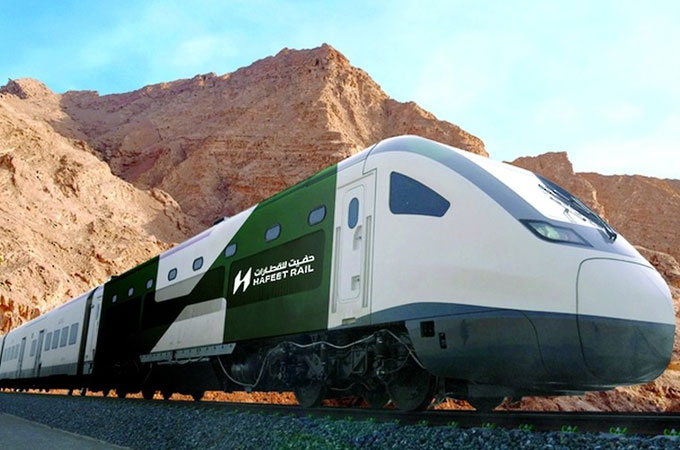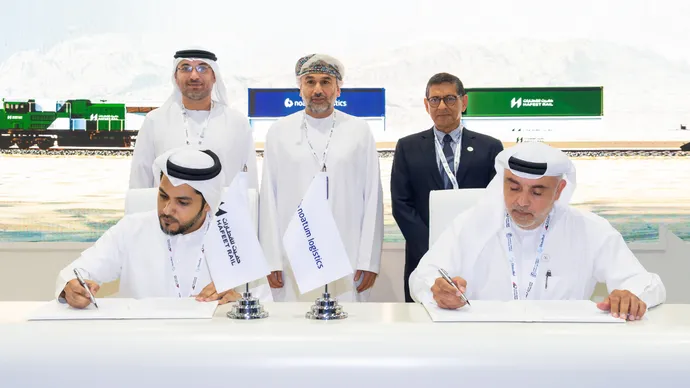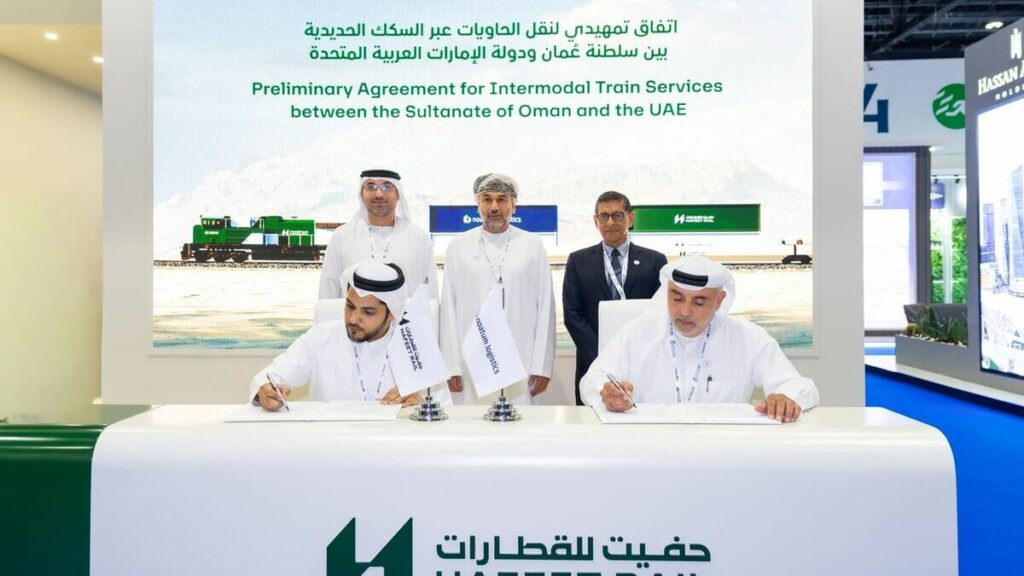UAE-Oman Freight Rail Service is set to redefine cross border logistics in the Gulf region. Noatum Logistics, a leading logistics company under AD Ports Group, has joined forces with Hafeet Rail to launch a dedicated freight rail service linking Sohar in Oman with Abu Dhabi in the United Arab Emirates. This collaboration represents a major leap forward in enhancing trade connectivity, efficiency, and sustainability between the two nations.
Introduction
Trade between the UAE and Oman has historically been strong, reflecting deep economic ties and shared strategic interests. The movement of goods across the two countries has predominantly relied on road transportation, which, despite its flexibility, faces challenges such as congestion, delays, and high carbon emissions.
Recognizing these challenges, the UAE and Oman are taking proactive measures to modernize cross border transportation. The launch of the UAE-Oman Freight Rail Service addresses these concerns by providing a dedicated, reliable, and environmentally friendly alternative to road transport. This development is expected to not only improve logistics efficiency but also support the economic and industrial growth of both countries.

The Strategic Importance of the Rail Link
Enhancing Trade Efficiency
The new freight rail service is designed to optimize the movement of goods between Sohar and Abu Dhabi. Trains dedicated to this route will significantly reduce transit times compared to conventional road transport, offering businesses a faster, more predictable shipping solution.
Beyond speed, the rail service introduces greater reliability. Weather conditions, traffic congestion, and road maintenance often disrupt road transport schedules, affecting industries that rely on timely deliveries. With a dedicated rail system, cargo movement becomes more consistent, minimizing the risk of delays and allowing companies to plan production and distribution more efficiently.

Strengthening Economic Ties
The rail service symbolizes the deepening economic collaboration between the UAE and Oman. By facilitating seamless cargo transport, it will strengthen bilateral trade and support the diversification of regional economies. Industries such as manufacturing, agriculture, construction materials, and pharmaceuticals stand to gain from faster and more cost effective logistics solutions.
Furthermore, this initiative will encourage new business partnerships and investment opportunities. Companies that previously faced logistical hurdles may now consider cross border expansion, knowing that their supply chains can be supported by a modern rail infrastructure.
Operational Details of the Service
Service Frequency and Capacity
The UAE-Oman Freight Rail Service is expected to operate on a daily schedule, ensuring consistent and reliable cargo transport. Each train is capable of carrying approximately 276 Twenty Foot Equivalent Units, which equates to an annual capacity of around 193,200 TEUs. This capacity represents a substantial increase in the volume of goods that can move between the two countries, reducing reliance on trucks and easing road traffic.
The regular service schedule allows businesses to plan shipments according to predictable timelines. With increased capacity and frequency, the service can accommodate growing trade volumes, reflecting the dynamic nature of regional commerce.
Types of Cargo
The freight rail service is versatile, designed to transport a wide variety of cargo. From manufactured goods and electronics to food products, raw materials, and pharmaceuticals, the rail system can handle diverse shipments.
This adaptability benefits multiple sectors:
- Manufacturing: Timely delivery of raw materials and finished products supports production schedules and distribution networks.
- Agriculture and Food Products: Perishable goods can reach markets faster, reducing spoilage and enhancing supply chain efficiency.
- Pharmaceuticals: Sensitive shipments requiring controlled conditions can be transported safely and reliably.
- Industrial Goods: Heavy or bulk cargo that might otherwise require multiple truck trips can be consolidated into single train shipments.

Technological and Infrastructure Developments
Hafeet Rail Network
Hafeet Rail is a pioneering project that connects Sohar Port in Oman to Abu Dhabi in the UAE. This cross border rail network is part of a larger vision to enhance the Gulf’s regional logistics infrastructure. The railway spans approximately 238 kilometers and is constructed with international safety, environmental, and operational standards in mind.
Modern technology underpins the project, including:
- Advanced signaling and communication systems for safe and efficient train operations.
- Infrastructure designed to accommodate heavy freight loads, ensuring long term reliability.
- Environmental safeguards to minimize ecological impact, supporting both countries’ sustainability goals.
The rail network is more than a transport route; it represents a strategic asset that will integrate with national and regional logistics networks, creating a seamless flow of goods across borders.
Integration with Existing Networks
The UAE-Oman Freight Rail Service is designed for seamless integration with existing rail and port infrastructure in both countries. At Abu Dhabi, the rail connects with the UAE National Rail Network, linking industrial hubs, ports, and distribution centers. In Oman, the network connects with Sohar Port, one of the nation’s busiest industrial and commercial hubs.
This connectivity enables efficient cargo handling, minimizes delays, and allows businesses to optimize logistics planning. By integrating multiple transport modes, rail, road, and sea, the system supports multimodal freight solutions, which are essential for modern supply chains.
Economic and Environmental Benefits
Boosting Regional Trade
The introduction of the freight rail service is expected to stimulate economic growth by providing a reliable, cost effective, and high capacity transport option. Businesses can now move goods with greater predictability and reduced costs, which encourages trade expansion and commercial collaboration.
This boost in efficiency is particularly relevant for small and medium enterprises that rely on dependable logistics but may lack the resources to handle complex transport operations. By making rail transport accessible and practical, the UAE-Oman Freight Rail Service levels the playing field and supports business growth.
Environmental Sustainability
Rail transport is widely recognized as a more sustainable alternative to road transportation. Trains consume less energy per ton of cargo moved and produce lower greenhouse gas emissions. By shifting significant freight volumes from trucks to rail, both the UAE and Oman aim to reduce carbon footprints and promote environmentally friendly trade practices.
Additionally, reduced road congestion translates to fewer accidents, less wear and tear on highways, and lower vehicle emissions. This aligns with regional and global initiatives to promote sustainable development and responsible logistics practices.

Regional and Global Significance
The UAE-Oman Freight Rail Service is not just a bilateral project; it has broader implications for the Gulf region. Efficient cross border logistics are crucial for regional economic integration and trade competitiveness. By establishing a reliable rail corridor, the UAE and Oman set an example for other Gulf Cooperation Council nations to follow.
Moreover, this service strengthens the region’s position in global trade networks. Efficient logistics infrastructure attracts investment, supports industrial diversification, and encourages international trade partnerships. In a world where supply chain resilience is critical, the UAE-Oman rail link offers a model for sustainable and dependable freight transport.
Future Prospects
Looking ahead, the freight rail service opens opportunities for further infrastructure expansion. Potential developments may include:
- Additional Rail Links: Expanding the network to connect other industrial and commercial hubs within both countries.
- Increased Capacity: As trade volumes grow, the rail service can scale to accommodate higher demand, further reducing reliance on road transport.
- Integration with Regional Networks: Connecting to wider Gulf Cooperation Council and international rail networks could facilitate trade beyond the UAE and Oman.
- Technological Innovations: Incorporating smart logistics systems, real time tracking, and automated cargo handling to enhance efficiency and reliability.
These future prospects indicate that the UAE-Oman Freight Rail Service is only the beginning of a transformative era in Gulf logistics.
Conclusion
The partnership between Noatum Logistics and Hafeet Rail is a landmark initiative in regional logistics. By launching a dedicated freight rail service between Sohar and Abu Dhabi, both nations are addressing longstanding challenges in cross border trade, while promoting sustainable, efficient, and reliable logistics solutions.
This development strengthens economic ties, boosts trade efficiency, and sets a benchmark for environmentally responsible transport. The UAE-Oman Freight Rail Service represents a forward thinking approach that not only meets current logistical needs but also lays the foundation for future growth and regional integration.
As the rail network becomes operational, it is expected to transform the way goods move across borders, reinforcing the UAE and Oman’s positions as hubs of trade, industry, and innovation in the Gulf region.
Do follow UAE Stories on Instagram
Read Next – Dubai Chamber Concludes Armenia Trade Mission with 301 B2B Meetings














